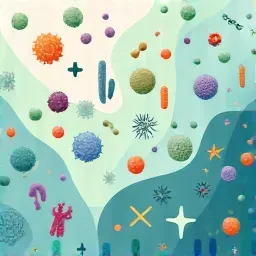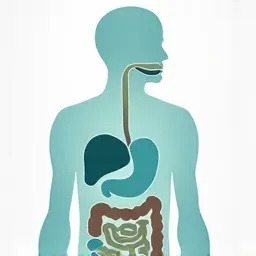Gut Microbiome 101: Your Complete Guide to the Trillions of Microbes That Shape Your Health

Gut Microbiome 101: Your Complete Guide to the Trillions of Microbes That Shape Your Health
Inside your digestive system lives a bustling metropolis of trillions of microorganisms—bacteria, fungi, viruses, and other microbes—that collectively make up your gut microbiome. This microscopic ecosystem is so influential on your health that scientists now consider it almost like an additional organ, playing crucial roles in everything from digestion and immunity to mood and metabolism.
If you've ever wondered what the gut microbiome actually is, why it matters so much for your health, or how you can support it naturally, this comprehensive guide will give you everything you need to know about these remarkable microscopic inhabitants that call your gut home.
What Exactly Is the Gut Microbiome?
The term "microbiome" refers to the collection of all microbes—such as bacteria, fungi, viruses, and their genes—that naturally live on and inside our bodies [1]. While microbes exist throughout your body, the vast majority reside in your large intestine (colon), where they form what we call the gut microbiome.
A Microscopic City in Your Gut
Picture a bustling city on a weekday morning, with sidewalks flooded with people rushing to work or appointments. Now imagine this at a microscopic level, and you have an idea of what your gut microbiome looks like [3]. Your gut houses:
- Trillions of microorganisms: As many microbes as there are human cells in your body [1]
- Over 1,000 species of bacteria: Plus viruses, fungi, and parasites [2]
- Thousands of different species: Each person's microbiome is as unique as their fingerprint [3]
- Genes from these microbes: Collectively containing more genetic material than your human genome [3]
Your Microbiome Is Uniquely Yours
Each person has an entirely unique network of microbiota that is originally determined by their DNA [3]. You first encounter microorganisms as an infant during delivery in the birth canal and through your mother's breast milk. The specific microorganisms you're exposed to depend entirely on the species found in your mother [3].
Later in life, environmental exposures and diet can change your microbiome to either benefit your health or place you at greater risk for disease [3]. This means your gut microbiome is both inherited and shaped by your lifestyle choices.
Where Does Your Gut Microbiome Live?
While you have some gut microbiota in your stomach and small intestine, most of them live in your large intestine (colon) [2]. They float around inside or attach to the mucous lining on the inner walls of your intestines.
The types of gut bacteria in your colon are different from those elsewhere in your digestive system. They're mostly anaerobic bacteria that require a low-oxygen environment to survive [2]. The higher oxygen levels, faster movement, and strong digestive juices in your upper GI tract prevent them from colonizing there.
These anaerobic gut bacteria perform important functions within your colon that only they can accomplish. They help break down indigestible fibers and produce essential nutrients that you can't get otherwise [2].
The Good, The Bad, and The Balanced
Your microbiome consists of microbes that are both helpful and potentially harmful [3]. Most are symbiotic, meaning both you and the microbiota benefit from the relationship. Some, in smaller numbers, are pathogenic (disease-promoting).
Beneficial Microbes: Your Microscopic Allies
The helpful microbes in your gut provide important services for your body [2]. You can think of your gut microbiome as a thriving native garden that you rely on for nutritious foods and medicines. When your garden is healthy and thriving, you thrive too [2].
When Balance Is Lost: Dysbiosis
In a healthy body, pathogenic and symbiotic microbiota coexist without problems. But if there's a disturbance in that balance—brought on by infectious illnesses, certain diets, or prolonged use of antibiotics or other bacteria-destroying medications—dysbiosis occurs [3].
Healthcare providers use the term "dysbiosis" to refer to an unbalanced or unhealthy gut microbiome, which can include [2]:
- A loss or deficit of beneficial bacteria
- Overgrowth of potentially pathogenic bacteria
- Loss of the healthy balance of gut bacteria
When dysbiosis occurs, your body may become more susceptible to disease [3].
How Your Gut Microbiome Benefits Your Health
Your gut microbiome plays such an active role in your body that some healthcare providers describe it as being almost like an organ itself [2]. These microscopic inhabitants support your health in numerous ways:
Digestive Support
Microbiota stimulate the immune system, break down potentially toxic food compounds, and synthesize certain vitamins and amino acids, including B vitamins and vitamin K [3]. For example, the key enzymes needed to form vitamin B12 are only found in bacteria, not in plants and animals [3].
Bacteria in your gut help break down certain complex carbohydrates and dietary fibers that you can't break down on your own [2]. They produce short-chain fatty acids (SCFAs) as byproducts—an important nutrient that feeds the cells in your gut lining and helps keep your overall gut environment healthy [2].
Immune System Function
Your gut is your largest immune system organ, containing up to 80% of your body's immune cells [2]. Beneficial microbes help train your immune system to distinguish between helpful and harmful microorganisms.
Helpful gut microbes also compete directly with unhelpful types for real estate and nutrients, preventing harmful bacteria from taking up too much territory [2]. The short-chain fatty acids produced by beneficial bacteria have anti-inflammatory properties and help maintain your gut barrier, keeping bacteria and bacterial toxins from escaping into your bloodstream [2].
Nervous System Connections
Gut microbes can affect your nervous system through the gut-brain axis—the network of nerves, neurons, and neurotransmitters that runs through your GI tract [2]. Certain bacteria actually produce or stimulate the production of neurotransmitters like serotonin that send chemical signals to your brain.
Researchers continue to investigate how your gut microbiome might be involved in various neurological, behavioral, nerve pain, and mood disorders [2].
Metabolic Health
Gut microbes and their products interact with endocrine cells in your gut lining, making your gut the largest endocrine system organ in your body [2]. These cells secrete hormones that regulate aspects of your metabolism, including blood sugar, hunger, and satiety.
Research continues to explore how your gut microbiome might be involved in metabolic syndrome, obesity, insulin resistance, Type 2 diabetes, and excess fat storage in your liver [2].
Major Families of Gut Bacteria
Large families of bacteria found in the human gut include Prevotella, Ruminococcus, Bacteroides, and Firmicutes [3]. In the colon's low-oxygen environment, you'll find anaerobic bacteria like Peptostreptococcus, Bifidobacterium, Lactobacillus, and Clostridium [3].
These microbes are believed to prevent the overgrowth of harmful bacteria by competing for nutrients and attachment sites to the mucus membranes of the gut—a major site of immune activity and production of antimicrobial proteins [3].
How Diet Shapes Your Microbiome
In addition to family genes, environment, and medication use, diet plays a large role in determining what kinds of microbiota live in your colon [3]. All of these factors create a unique microbiome from person to person.
The Power of Fiber
A high-fiber diet particularly affects the type and amount of microbiota in your intestines [3]. Dietary fiber can only be broken down and fermented by enzymes from microbiota living in the colon. Short-chain fatty acids are released as a result of fermentation, which lowers the pH of the colon and determines the type of microbiota that can survive in this acidic environment [3].
The lower pH limits the growth of some harmful bacteria like Clostridium difficile [3]. Growing research on SCFAs explores their wide-ranging effects on health, including stimulating immune cell activity and maintaining normal blood levels of glucose and cholesterol [3].
Prebiotic Foods: Feeding Your Good Bacteria
Foods that support increased levels of SCFAs are indigestible carbohydrates and fibers such as inulin, resistant starches, gums, pectins, and fructooligosaccharides [3]. These fibers are sometimes called prebiotics because they feed your beneficial microbiota.
The highest amounts of prebiotics are found in raw versions of [3]:
- Garlic and onions
- Leeks and asparagus
- Jerusalem artichokes
- Dandelion greens
- Bananas
- Seaweed
In general, fruits, vegetables, beans, and whole grains like wheat, oats, and barley are all good sources of prebiotic fibers [3].
Probiotic Foods: Adding Beneficial Microbes
Probiotic foods contain beneficial live microorganisms that may further alter your microbiome [3]. These include fermented foods like:
- Kefir and yogurt with live active cultures
- Pickled vegetables
- Tempeh and miso
- Kombucha tea
- Kimchi and sauerkraut
Note that not all fermented foods contain live microorganisms, especially if they've been heated or pasteurized after fermentation, which destroys the bacteria [3].
Environmental Factors That Affect Your Microbiome
Just like a garden, your gut microbiome is affected by the nutrients and pollutants, pests and weeds it's exposed to [2]. Several environmental factors can influence your microbiome:
Chemical Exposures
NIEHS-supported research has found that various environmental factors can affect the microbiome [1]:
- Air pollution: Breathing ultrafine particles altered the gut microbiome and changed lipid metabolism in mice with atherosclerosis
- Antimicrobials: Triclosan, a common ingredient in antimicrobial products, profoundly affected the gut microbiome in mice
- Artificial sweeteners: Sucralose changes the gut microbiome in mice and may increase the risk of chronic inflammation
- Heavy metals: Arsenic exposure changed the gut microbiome and altered important molecular pathways in bacteria
Medications
Chemicals that may harm your microbiome include environmental toxins like alcohol, tobacco smoke, and pollutants [2]. Additionally, medications like antibiotics can wipe out good bacteria along with the bad, while acid blockers can affect your microbiome by changing the pH inside your gut.
Your gut microbiome can usually recover from temporary chemical exposure, but chronic exposure can affect its composition [2].
Stress and Lifestyle
Research shows that chronic stress disturbs the gut microbiome in mice, triggering an immune response and promoting the development of colitis [1]. Other lifestyle factors like sleep, exercise, and overall health also influence your microbiome composition.
Signs of an Unhealthy Gut Microbiome
Typical symptoms of gut dysbiosis include [2]:
- Gas and gas pain
- Bloated stomach
- Poor digestion
- Lower abdominal pain
- Diarrhea or constipation
Conditions directly related to gut dysbiosis include infections, small intestinal bacterial overgrowth (SIBO), and inflammatory bowel disease [2]. Other conditions that may be indirectly related include allergies, anxiety, asthma, diabetes, depression, and obesity [2].
How to Support Your Gut Microbiome Naturally
A healthy diet and lifestyle encourage a healthy gut microbiome [2]. Here are evidence-based strategies to support your microscopic allies:
Dietary Strategies
- Eat a plant-rich diet: Aim for a variety of whole foods like whole grains, vegetables, and fruits. These offer plenty of dietary fiber for your gut microbes as well as micronutrients for you [2]
- Include prebiotic foods: Gradually increase your intake of fiber-rich foods that feed beneficial bacteria
- Try probiotic foods: Include fermented foods with live cultures in your diet
- Limit processed foods: These lack fiber and micronutrients while often containing additives that can harm your microbiome [2]
Lifestyle Factors
- Use antibiotics wisely: Take them when necessary, but avoid overuse. Sometimes antibiotic disruption leads to the wrong kind of bacteria coming back stronger [2]
- Manage stress: Chronic stress can disrupt your gut microbiome and trigger inflammation
- Get regular exercise: Physical activity supports a healthy and diverse microbiome
- Prioritize sleep: Poor sleep can affect gut bacteria composition and function
Important Considerations
Be aware that a high intake of prebiotic foods, especially if introduced suddenly, can increase gas production and bloating [3]. If you have gastrointestinal sensitivities like irritable bowel syndrome, introduce these foods in small amounts to assess tolerance first. With continued use, tolerance may improve with fewer side effects [3].
The Future of Microbiome Research
The microbiome is a living, dynamic environment where the relative abundance of species may fluctuate daily, weekly, and monthly depending on diet, medication, exercise, and other environmental exposures [3]. Scientists are still in the early stages of understanding the microbiome's broad role in health.
Current research areas include [3]:
- How the microbiome and their metabolites influence human health and disease
- What factors influence the framework and balance of one's microbiome
- The development of probiotics as functional foods
- Differences in the microbiome between healthy individuals and those with chronic diseases
- Developing diagnostic biomarkers from the microbiome to identify diseases before they develop
- Alteration of the microbiome through transplantation of microbes between individuals
Should You Get Your Microbiome Tested?
Many commercial labs offer gut microbiome testing kits to consumers, but clinical healthcare providers generally don't use or recommend these tests [2]. The reason is that we still don't know enough about the different types of gut microbiota or how they affect our health to make these reports practically useful for personalized healthcare advice.
There's exciting research in progress, but it has some ways to go before a gut microbiome test can give you practical, personalized healthcare recommendations [2].
Key Takeaways
- Your gut microbiome consists of trillions of microorganisms that play crucial roles in digestion, immunity, and overall health
- Each person's microbiome is unique, shaped by genetics, birth method, diet, and environmental exposures
- A balanced microbiome supports digestive health, immune function, and may influence mood and metabolism
- Diet, particularly fiber intake, significantly affects your microbiome composition
- Prebiotic foods feed beneficial bacteria, while probiotic foods add beneficial microbes
- Environmental factors like medications, stress, and chemical exposures can disrupt microbiome balance
- Supporting your microbiome involves eating a diverse, plant-rich diet and maintaining healthy lifestyle habits
- While microbiome testing is available, it's not yet clinically useful for personalized health recommendations
Your gut microbiome represents one of the most exciting frontiers in health research. While we're still learning about these microscopic inhabitants, what's clear is that supporting them through a healthy diet and lifestyle can have far-reaching benefits for your overall wellbeing. By understanding and nurturing your gut microbiome, you're investing in a fundamental aspect of your health that influences everything from digestion to immunity to potentially even your mood.
References
- National Institute of Environmental Health Sciences. Microbiome. Available from: https://www.niehs.nih.gov/health/topics/science/microbiome
- Cleveland Clinic. What Is Your Gut Microbiome? Updated August 18, 2023. Available from: https://my.clevelandclinic.org/health/body/25201-gut-microbiome
- Harvard T.H. Chan School of Public Health. The Microbiome. Available from: https://nutritionsource.hsph.harvard.edu/microbiome/
Disclaimer: This article is for educational purposes only and is not intended as medical advice. Always consult with a qualified healthcare provider for proper diagnosis and treatment of any digestive health concerns.



